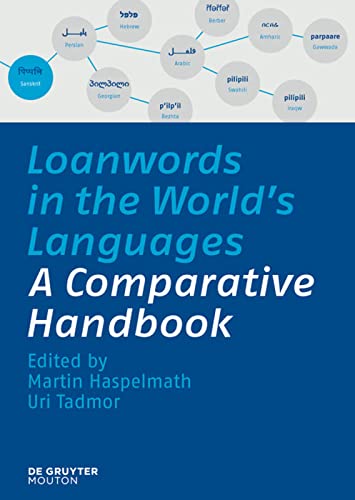

Most ebook files are in PDF format, so you can easily read them using various software such as Foxit Reader or directly on the Google Chrome browser.
Some ebook files are released by publishers in other formats such as .awz, .mobi, .epub, .fb2, etc. You may need to install specific software to read these formats on mobile/PC, such as Calibre.
Please read the tutorial at this link. https://ebooknice.com/page/post?id=faq
We offer FREE conversion to the popular formats you request; however, this may take some time. Therefore, right after payment, please email us, and we will try to provide the service as quickly as possible.
For some exceptional file formats or broken links (if any), please refrain from opening any disputes. Instead, email us first, and we will try to assist within a maximum of 6 hours.
EbookNice Team

Status:
Available0.0
0 reviews
ISBN-10 : 3110218437
ISBN-13 : 9783110218435
Author: Martin Haspelmath
This book is the first work to address the question of what kinds of words get borrowed in a systematic and comparative perspective. It studies lexical borrowing behavior on the basis of a world-wide sample of 40 languages, both major languages and minor languages, and both languages with heavy borrowing and languages with little lexical influence from other languages.
The book is the result of a five-year project bringing together a unique group of specialists of many different languages and areas. The introductory chapters provide a general up-to-date introduction to language contact at the word level, as well as a presentation of the project's methodology. All the chapters are based on samples of 1000-2000 words, elicited by a uniform meaning list of 1460 meanings. The combined database, comprising over 70,000 words, is published online at the same time as the book is published. For each word, information about loanword status is given in the database, and the 40 case studies in the book describe the social and historical contact situations in detail.
General chapters
I. The Loanword Typology project and the World Loanword Database — Martin Haspelmath and Uri Tadmor (trang 1)
II. Lexical borrowing: Concepts and issues — Martin Haspelmath (trang 35)
III. Loanwords in the world’s languages: Findings and results — Uri Tadmor (trang 55)
The languages (case studies)
1. Loanwords in Swahili — Thilo C. Schadeberg (trang 76)
2. Loanwords in Iraqw, a Cushitic language of Tanzania — Maarten Mous & Martha Qorro (trang 103)
3. Loanwords in Gawwada, a Cushitic language of Ethiopia — Mauro Tosco (trang 124)
4. Loanwords in Hausa, a Chadic language in West Africa — Ari Awagana, H. Ekkehard Wolff & Doris Löhr (trang 142)
5. Loanwords in Kanuri, a Saharan language — Doris Löhr, H. Ekkehard Wolff & Ari Awagana (trang 166)
6. Loanwords in Tarifiyt, a Berber language of Morocco — Maarten Kossmann (trang 191)
7. Loanwords in Seychelles Creole — Susanne Michaelis & Marcel Rosalie (trang 215)
8. Loanwords in Romanian — Kim Schulte (trang 230)
9. Loanwords in Selice Romani, an Indo‑Aryan language of Slovakia — Viktor Elšík (trang 260)
10. Loanwords in Lower Sorbian, a Slavic language of Germany — Hauke Bartels (trang 304)
11. Loanwords in Old High German — Roland Schuhmann (trang 330)
12. Loanwords in Dutch — Nicoline van der Sijs (trang 338)
13. Loanwords in British English — Anthony P. Grant (trang 360)
14. Loanwords in Kildin Saami, a Uralic language of northern Europe — Michael Rießler (trang 384)
15. Loanwords in Bezhta, a Nakh‑Daghestanian language of the North Caucasus — Bernard Comrie & Madzhid Khalilov (trang 414)
16. Loanwords in Archi, a Nakh‑Daghestanian language of the North Caucasus — Marina Chumakina (trang 430)
17. Loanwords in Manange, a Tibeto‑Burman language of Nepal — Kristine A. Hildebrandt (trang 447)
18. Loanwords in Ket — Edward J. Vajda (trang 471)
19. Loanwords in Sakha (Yakut), a Turkic language of Siberia — Brigitte Pakendorf & Innokentij N. Novgorodov (trang 496)
20. Loanwords in Oroqen, a Tungusic language of China — Fengxiang Li & Lindsay J. Whaley (trang 525)
21. Loanwords in Japanese — Christopher K. Schmidt (trang 545)
22. Loanwords in Mandarin Chinese — Thekla Wiebusch & Uri Tadmor (trang 575)
23. Loanwords in Thai — Titima Suthiwan & Uri Tadmor (trang 599)
24. Loanwords in Vietnamese — Mark J. Alves (trang 617)
25. Loanwords in White Hmong — Martha Ratliff (trang 638)
26. Loanwords in Ceq Wong, an Austroasiatic language of Peninsular Malaysia — Nicole Kruspe (trang 659)
27. Loanwords in Indonesian — Uri Tadmor (trang 686)
28. Loanwords in Malagasy — Alexander Adelaar (trang 717)
29. Loanwords in Takia, an Oceanic language of Papua New Guinea — Malcolm Ross (trang 747)
30. Loanwords in Hawaiian — ʻŌiwi Parker Jones (trang 771)
31. Loanwords in Gurindji, a Pama‑Nyungan language of Australia — Patrick McConvell (trang 790)
32. Loanwords in Yaqui, a Uto‑Aztecan language of Mexico — Zarina Estrada Fernández (trang 823)
33. Loanwords in Zinacantán Tzotzil, a Mayan language of Mexico — Cecil H. Brown (trang 848)
34. Loanwords in Q’eqchi’, a Mayan language of Guatemala — Søren Wichmann & Kerry Hull (trang 873)
35. Loanwords in Otomi, an Otomanguean language of Mexico — Ewald Hekking & Dik Bakker (trang 897)
36. Loanwords in Saramaccan, an English‑based creole of Suriname — Jeff Good (trang 918)
37. Loanwords in Imbabura Quechua — Jorge Gómez Rendón & Willem Adelaar (trang 944)
38. Loanwords in Kali’na, a Cariban language of French Guiana — Odile Renault‑Lescure (trang 968)
39. Loanwords in Hup, a Nadahup language of Amazonia — Patience Epps (trang 992)
40. Loanwords in Wichí, a Mataco‑Mataguayan language of Argentina — Alejandra Vidal & Verónica Nercesian (trang 1015)
41. Loanwords in Mapudungun, a language of Chile and Argentina — Lucía A. Golluscio (trang 1035)
loanwords in the world's languages a comparative handbook
loanwords in the world's languages a comparative handbook pdf
loanwords in the world's languages findings and results
how many words in the world all languages
loanwords in the english language
Tags: Loanwords, the World, Languages, Comparative Handbook, Martin Haspelmath